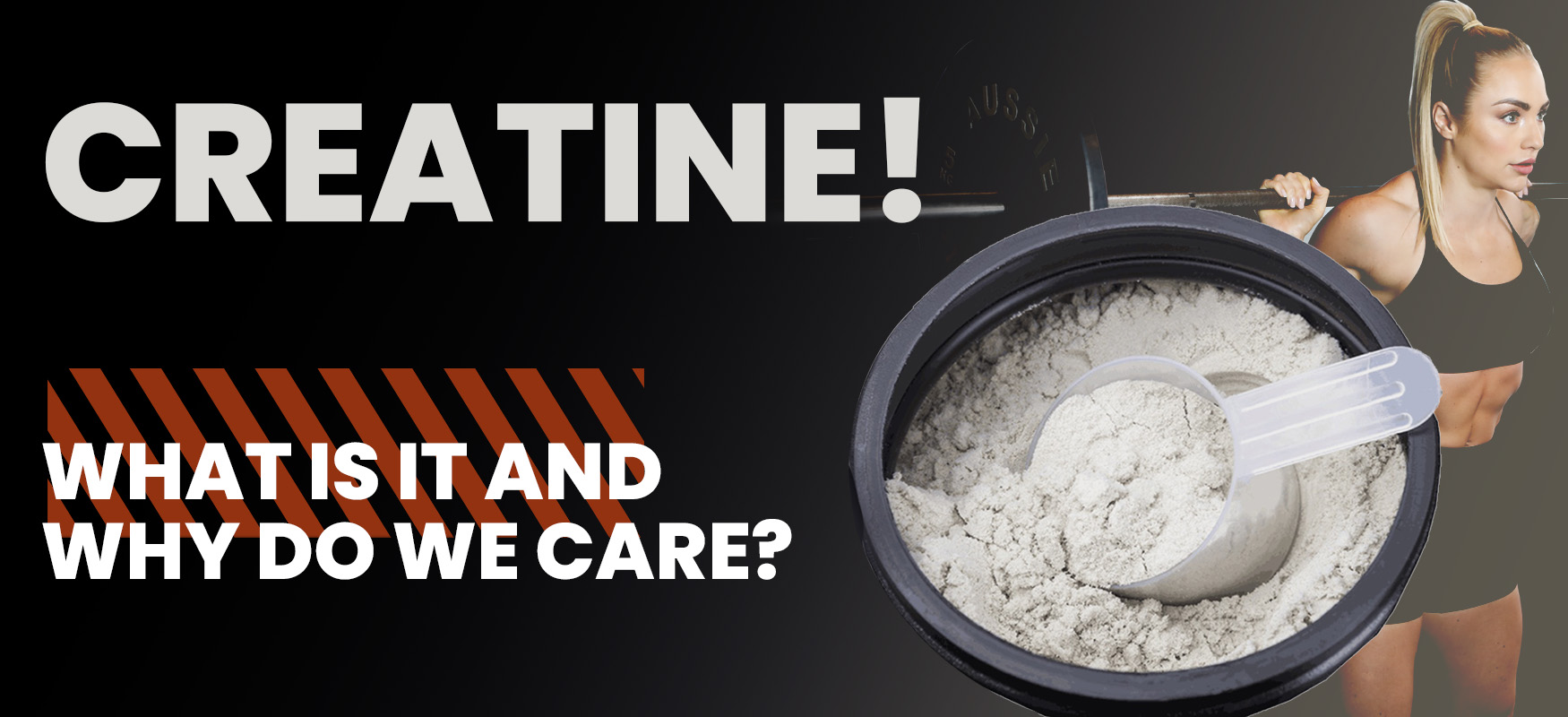Creatine! What is it and why do we care?

Before we get into it, I’d like to make one thing very clear – I’m not a fan of supplements. In fact, I RARELY recommend them to my clients. My advice is always the same – eat well, prioritise sleep, get enough vitamin D, manage stress and you will mostly have all you need (I say mostly because there are situations that do call for supplementation).
But there is ONE supplement that I recommend to almost ALL of my clients – and that’s creatine monohydrate!
What is creatine?
Creatine is naturally produced by the liver or consumed in foods such as meat and fish and almost all of our creatine stores are found in skeletal muscle.
How does creatine supplementation work?
Your body requires a molecule called adenosine-triphosphate (ATP) during hard exercise such as resistance training. In this case, triphosphate = three phosphate molecules. The energy required during resistance training causes one phosphate group to be removed through a process called hydrolysis. This leaves two remaining phosphate molecules (aka adenosine di-phosphate). Now ADP can still create energy but it is like using a used battery compared to ATP which is the equivalent of a full battery.
The ATP–creatine phosphate system transfers a high-energy phosphate from creatine phosphate to (ADP) to regenerate ATP which is what we want if we want to perform at our best! Creatine can also improve muscle contractility (which is obviously important for hypertrophy) and it buffers pH changes brought on by lactic acid to improve recovery.
Why supplement if you can get creatine through diet alone?
It’s actually quite difficult to eat enough creatine rich foods to fully ‘saturate’ a muscle cell. Which is why supplementation is so beneficial.
Benefits of creatine supplementation:
- Increases training quality
- Increases strength
- Increases performance
- Improves fat-free mass
- Improves recovery
- Increases anabolic signalling (hello gainz)
- Amplifies training induced adaptations
- May improve effects of sleep deprivation
This means one thing for you – better performance and better recovery!
NOTE: Creatine does not prevent or suppress delayed onset muscle soreness (DOMS).
Dosage
3-5 grams daily.
Creatine becomes effective when it saturates the muscle cell. You can achieve this via two ways: first, you can take an initial loading phase of 20 g/day for 5–7 days, followed by a maintenance phase of 3–5 g/day. Or, you can take a daily dose of 3-5 g for X amount of days until the muscle cell becomes saturated. Obviously a loading dose will lead to full saturation of a muscle cell before a daily dose does. But some people find that they experience gastrointestinal upset when creatine is taken as a loading dose. This seems to be attenuated when a daily dose of 3-5 g is taken. It can take up to a month to saturate a muscle cell if it’s taken in a daily dose.
When should you take it?
If we are talking about what’s ‘optimal’, you should aim to take creatine after training and avoid taking it with caffeine. But the aim is to take it daily so whenever it works best for you.
Which one should I take?
Creatine monohydrate is the most studied formulation. It’s cheap and it’s effective.
Side effects
- Gastrointestinal upset (especially when taken as a loading dose)
- Weight gain
Now I know you are low key freaking about the weight gain comment!
Remember that weight gain is not the same as fat gain. You will weigh more as your muscle cells begin to become saturated (how much weight depends on the person, expect up to a few kgs give or take) due to intracellular water retention. This is a good thing – your muscles will look ‘fuller’ once you reach saturation levels! It means the supplement is working and doing its thing. But it’s good to be mindful of this if you are in the middle of a fat loss phase.
Myths!
A common misconception is that creatine is ‘bad’ for your kidneys. Several studies have shown that creatine supplementation does not cause kidney damage in the absence of acute or chronic kidney disease. If you have a pre-existing kidney injury, then creatine supplementation should be avoided. Another common misconception is that you should cycle on and off of creatine. This isn’t needed. You don’t need to take a ‘break’ from creatine supplementation. Creatine also doesn’t cause muscle cramping as some people suggest.
Does creatine cause hair loss?
Okay so there is SOME merit to this – but the evidence isn’t strong. The theory is that creatine supplementation increases the hormone DHT and that an increase in DHT causes hair loss. The problem with this theory is that there was ONE study that showed that creatine supplementation increases DHT and several other studies were unable to replicate the findings of that isolated study in those who have a genetic predisposition to hair loss. More research is needed in this area for sure!
To wrap it up!
All in all, creatine supplementation is positive for performance and recovery and there may even be added health benefits, especially as we age!
Yours in health,
Sheridan Skye
Head of Nutrition







